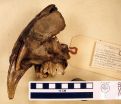EARTH: Bigger is better in the sea
2015-07-01
(Press-News.org) Alexandria, VA - Analyzing thousands of records, researchers have reinforced the claim that for marine life, bigger has been better for the last 542 million years. The study examined Cope's rule - the idea, named for paleontologist Edward Drinker Cope, that species evolve to larger sizes over time.
With the help of undergraduate students and high-school interns, the researchers compiled information on five major marine phyla, including arthropods, brachiopods, chordates, echinoderms and mollusks. Find out how much bigger things got in the June issue of EARTH Magazine: http://www.earthmagazine.org/article/bigger-better-sea.
Including several complimentary articles published online every month, EARTH Magazine brings you even more of the science behind the headlines in the full June 2015 Issue now available on the digital newsstand at http://www.earthmagazine.org. Stories include Travels in Geology: Hiking the Catskill Mountains, Down to Earth: Geophysicist Peter Molnar, and more coverage of the latest research conducted in the geosciences.
INFORMATION:
Keep up to date with the latest happenings in Earth, energy and environment news with EARTH magazine online at: http://www.earthmagazine.org/. Published by the American Geosciences Institute, EARTH is your source for the science behind the headlines.
The American Geosciences Institute is a nonprofit federation of geoscientific and professional associations that represents more than 250,000 geologists, geophysicists and other earth scientists. Founded in 1948, AGI provides information services to geoscientists, serves as a voice of shared interests in the profession, plays a major role in strengthening geoscience education, and strives to increase public awareness of the vital role the geosciences play in society's use of resources, resiliency to natural hazards, and interaction with the environment.
ELSE PRESS RELEASES FROM THIS DATE:
2015-07-01
New research shows that the fearsome teeth of the saber-toothed cat Smilodon fatalis fully emerged at a later age than those of modern big cats, but grew at a rate about double that of their living relatives. The findings, published today in the journal PLOS ONE and based on a new technique that combines isotopic analysis and x-ray imaging, for the first time provide specific ages for developmental events in Smilodon, notably in their teeth. The study estimates that the eruption rate of S. fatalis's permanent upper canines was 6 millimeters per month--double the growth ...
2015-07-01
Statins are a hugely popular drug class used to manage blood cholesterol levels and reduce the risk of heart disease. Previous studies had raised questions about adverse behavioral changes with statins, such as irritability or violence, but findings with statins have been inconsistent. In the first randomized trial to look at statin effects on behavior, researchers at the University of California, San Diego School of Medicine report that aggressive behavior typically declined among men placed on statins (compared to placebo), but typically increased among women placed on ...
2015-07-01
A newly-discovered, 48-million-year-old fossil, known as a "Jesus lizard" for its ability to walk on water, may provide insight into how climate change may affect tropical species, according to a study published July 1 in the open-access journal PLOS ONE by Jack Conrad from American Museum of Natural History.
Modern relatives of the Jesus lizard live in an area stretching from central Mexico to northern Colombia, flourishing in the higher temperatures found at the equator. Members of various animal, plant, fungal, and other clades currently confined to the tropics or ...
2015-07-01
An international team of researchers has found some of the first solid evidence that narcolepsy may be a so-called "hit-and-run" autoimmune disease.
The researchers sought to determine why, of two different flu vaccines widely deployed during the 2009 swine flu pandemic, only one was associated with a spike in the incidence of narcolepsy, a rare sleep disorder.
A paper describing their findings will be published July 1 in Science Translational Medicine. Lawrence Steinman, MD, a professor of pediatrics and of neurology and neurological sciences, is the senior author. ...
2015-07-01
While most Americans do not support policies designed to increase distribution of naloxone - a medication that reverses the effects of a drug overdose - certain types of educational messages about its lifesaving benefits may bolster support for its use, new Johns Hopkins Bloomberg School of Public Health research suggests.
In a report published July 1 in the journal PLOS ONE, the researchers say that combining educational messages about naloxone with sympathetic narratives about people who could have been saved had the drug been available could be key to increasing support ...
2015-07-01
Widely hailed as 'green' sources of renewable energy, hydroelectric dams have been built worldwide at an unprecedented scale. But research from the University of East Anglia reveals that these major infrastructure projects are far from environmentally friendly.
A study published today in PLOS ONE reveals the drastic effects of the major Amazonian Balbina Dam on tropical rainforest biodiversity.
The research reveals a loss of mammals, birds and tortoises from the vast majority of islands formed by the creation of the vast Balbina Lake, one of the world's largest hydroelectric ...
2015-07-01
Vitamin B12 supplements offer no benefits for neurological or cognitive function in older people with moderate vitamin B12 deficiency, according to a new study published in the American Journal of Clinical Nutrition.
Around one sixth of people in the UK aged over 75 have vitamin B12 deficiency, which when severe can lead to significant problems in the nervous system including muscle weakness, problems with walking, tiredness, and pins and needles, as well as depression and problems with memory and other important everyday cognitive functions. Vitamin B12 is found in everyday ...
2015-07-01
New collaborative research between NOAA, University of Alaska and an Alaskan shellfish hatchery shows that ocean acidification may make it difficult for Alaskan coastal waters to support shellfish hatcheries by 2040 unless costly mitigation efforts are installed to modify seawater used in the hatcheries.
"Our research shows there could be significant effects from ocean acidification on Alaska's emerging shellfish hatchery industry in a matter of two and half decades," said Jeremy Mathis, Ph.D., an oceanographer at NOAA's Pacific Marine Environmental Laboratory and a ...
2015-07-01
Mandatory targets to reduce salt in processed food would help tackle inequalities in coronary heart disease that lead to excess deaths in deprived areas of England, according to research by the University of Liverpool.
Consuming high amounts of salt causes high blood pressure which increases the risk of cardiovascular disease. Current average UK salt intakes are around eight grams per adult per day, whilst the UK government recommends less than six grams per day. Individuals living in more deprived areas of England often consume larger amounts of salt, and this contributes ...
2015-07-01
Researchers at the Hanover Centre for Optical Technologies (HOT), University of Hanover, Germany, have developed a self-contained fiber optic sensor for smartphones with the potential for use in a wide variety of biomolecular tests, including those for detecting pregnancy or monitoring diabetes. The readings of the sensor can run through an application on a smartphone which provide real-time results. When properly provisioned, the smartphone-user has the ability to monitor multiple types of body fluids, including: blood, urine, saliva, sweat or breath. In case of medical ...
LAST 30 PRESS RELEASES:
[Press-News.org] EARTH: Bigger is better in the sea



